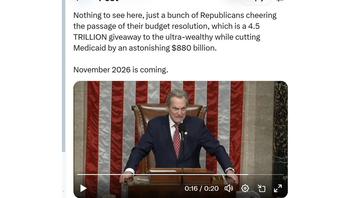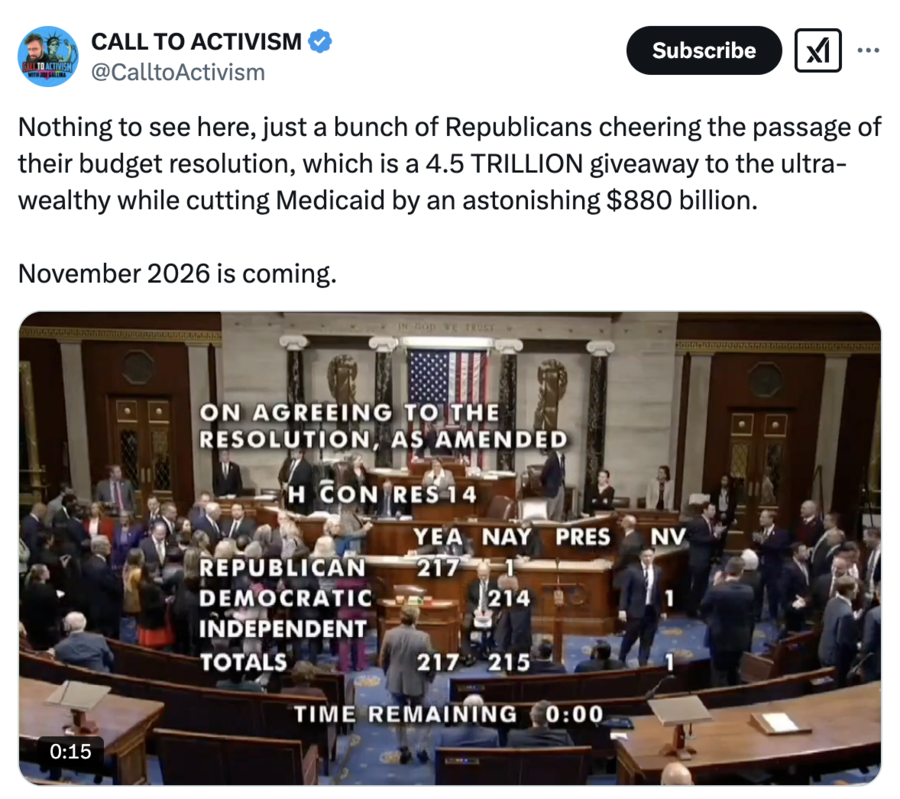
Nothing to see here, just a bunch of Republicans cheering the passage of their budget resolution, which is a 4.5 TRILLION giveaway to the ultra-wealthy while cutting Medicaid by an astonishing $880 billion.
November 2026 is coming.
Below is how the post appeared at the time of this writing:
(Source: X screenshot taken Wed Feb 26 07:39:50 2025 UTC)
On February 25, 2025, the House passed its budget resolution (archived here) that included $880 billion in budget cuts to programs under the House Energy and Commerce Committee's jurisdiction. The committee proposes funding for Medicaid, as well as energy, environment, trade, manufacturing, communications, technology and commerce programs.
Medicaid was not cut by $880 billion, nor is the program specifically mentioned in the House resolution.
Mariana Socal, associate professor at the Johns Hopkins Bloomberg School of Public Health, told Lead Stories that it's not yet known what the proposed budget means for Medicaid.
"We are in the speculative phase because the bill is identifying and requiring these budget cuts, but it's not specifying how or where they should be obtained," Socal told Lead Stories in a phone interview on February 26, 2025.
It's unknown to what extent Medicaid will be impacted. Socal says leadership will decide where those cuts will occur and could affect "a range of different programs that the committee may want to identify as targets" -- not just Medicaid.
"The Medicaid program, generally speaking, takes up a significant portion of the federal budget, so it is a concern just because of its size. It is a very sizable program when it comes to impact on the federal budget."
Medicaid is a state-administered program receiving federal funds
States administer Medicaid, but funding comes in part from federal sources. The U.S. Department of Health and Human Services writes:
Medicaid is a joint federal and state program that helps cover medical costs for some people with limited income and resources. The federal government has general rules that all state Medicaid programs must follow, but each state runs its own program. This means eligibility requirements and benefits can vary from state to state.
Medicaid offers benefits that Medicare doesn't normally cover, like nursing home care and personal care services. People with Medicaid usually don't pay anything for covered medical expenses but may owe a small co-payment for some items or services.
According to the American Journal of Medical Care, states could be forced to make up for shortfalls in federal funding, with potentially widespread implications.
Those impacts, however, are yet to be determined.
Federal budget process
Each year, Congress puts together a budget for the next fiscal year, which runs from October 1 through September 30. On February 25, 2025, the House approved a resolution outlining the size of the 2025 budget and budgetary levels for the following fiscal years 2026 through 2034.
The U.S. Government's official website notes that the annual budget covers three spending areas:
Mandatory spending - funding for Social Security, Medicare, veterans benefits, and other spending required by law. This typically uses over half of all funding.
Discretionary spending - federal agency funding. Congress sets funding levels for these each year. This usually accounts for around a third of all funding.
Interest on the debt - this usually uses less than 10 percent of all funding.
Approval in the House is just one of many steps toward creating the federal budget, which begins a year before going into effect. The government outlines the process in the following way:
Federal agencies create budget requests and submit them to the White House Office of Management and Budget (OMB).
OMB refers to the agencies' requests as it develops the budget proposal for the president.
The president submits the budget proposal to Congress early the next year.
Proposed funding is divided among 12 subcommittees, which hold hearings. Each is responsible for funding for different government functions such as defense spending or energy and water.
The House and Senate create their own budget resolutions, which must be negotiated and merged. Both houses must pass a single version of each funding bill.
Congress sends the approved funding bills to the president to sign or veto.
Read more
More Lead Stories fact checks involving the federal budget can be read here.


















